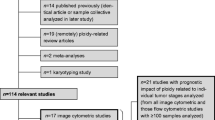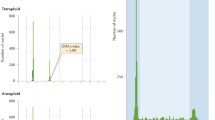Abstract
PURPOSE: This study was designed to determine the reliability of DNA analysis in predicting outcome of patients with colorectal carcinoma and compare the prognostic efficacy of DNA analysis using two parameters vs.a single parameter. METHODS: Two hundred forty-eight patients with colon and rectal carcinoma were entered in the study over a period of 84 months. Thirty-one percent of carcinomas were found in the rectum. A total of 23.6 percent of cancers were found in the sigmoid colon. Majority of the patients were 60 years or older. Male to female ratio was equal. The colon bearing carcinoma was sent in a fresh state after resection for flow cytometry and DNA analysis. In this study, analysis was made, comparing two parameters (aneuploidy and S-phase fraction over 20 percent) with single parameters (aneuploidy) for staging and as a prognostic indicator in patients with colon and rectal carcinoma. RESULTS: The combined presence of aneuploidy and S-phase fraction over 20 indicated a poorer prognosis in patients with colon and rectal carcinoma. The prediction of patient outcome was more accurate with DNA analysis using two parameters than using a single parameter alone (P value=0.00003). CONCLUSION: In our analysis, the odds of survival are over 3.7 times greater for aneuploidy than aneuploidy plus S-phase fraction over 20 percent.
Similar content being viewed by others
References
Barlogie B, Raber MN, Schumann J,et al. Flow cytometry in clinical cancer research. Cancer Res 1983;43:3982–97.
Banner BF, Tomas-de la Vega JE, Roseman DL, Coons JS. Should flow cytometric DNA analysis precede definitive surgery for colon carcinoma? Ann Surg 1985;202:740–4.
Frankfurt OS, Slocum HK, Rustum YM,et al. Flow cytometric analysis of DNA aneuploidy in primary and metastatic human solid tumors. Cytometry 1984;5:71–80.
Dean PA, Vernava AM III. Flow cytometric analysis of DNA content in colorectal carcinoma. Dis Colon Rectum 1992;35:95–102.
Johnson TS, Katz RL, Perkouse M. Flow cytometric applications in cytopathology. Anal Quant Cytol Histol 1988;10:423–58.
Darzynkiewiez Z. Flow cytometry in cytopathology: overview and perspectives. Anal Quant Cytol Histol 1988;10:459–61.
Bauer K, Lincoln ST, Vera-Roman J,et al. Prognostic implications of the proliferative activity and DNA aneuploidy in colonic adenocarcinomas. Lab Invest 1987;57:329–35.
Quirke P, Dixon MF, Clayden A,et al. Prognostic significance of DNA aneuploidy and cell proliferation in rectal adenocarcinomas. J Pathol 1987;151:285–91.
Agresti A. Categorical data analysis. New York: Wiley, 1990.
Bishop YMM, Fienberg SE, Holland PW. Discrete multivariate analysis: theory and practice. Cambridge: MIT Press, 1975.
Fienberg SE. The analysis of cross-classified categorical data. Cambridge: MIT Press, 1990.
Wolley RC, Schreiber K, Koss LG, Larns M, Shurman A. DNA distribution in human colon carcinomas and its relationship to clinical behavior. J Natl Cancer Inst 1982;69:15–22.
Armitage NC, Robins RA, Evans DF, Turner DR, Baldwin RW, Hardcastle JD. The influence of tumor cell DNA abnormalities on survival in colorectal cancer. Br J Surg 1985;72:828–30.
Kokal W, Shibani K, Terz J, Harada JR. Tumor DNA content in the prognosis of colorectal carcinoma. JAMA 1986;255:3123–7.
Witzig TE, Loprinzi CL, Cronchoroff NJ,et al. DNA ploidy and cell kinetic measurements as predictors of recurrence and survival in stages B2 and C, colorectal adenocarcinoma. Cancer 1991;68:879–88.
Scott N, Weiand H, Moertel C,et al. Colorectal cancer. Dukes' stage tumor site, preoperative plasma CEA level and patient prognosis related to tumor DNA ploidy pattern. Arch Surg 1987;122:1375–9.
Ronum T, Thorud E, Lund E. Survival of large bowel carcinoma patients with different DNA ploidy. J Cancer 1987;56:633–6.
Jones D, Moore M, Schofield P. Prognostic significance of DNA ploidy in colorectal cancer: a prospective flow cytometry study. Int J Cancer 1988;41:206–10.
Wiggers T, Arends J, Schutte B,et al. A multivariate analysis of pathologic prognostic indicators in large bowel cancer. Cancer 1988;61:386–90.
Scott NA, Rainwater LM, Weiand HS,et al. The relative prognostic value of flow cytometric DNA analysis and conventional clinicopathologic criteria in patients with operable rectal carcinoma. Dis Colon Rectum 1987;30:513–20.
Schutte B, Reynders MM, Wiggers T,et al. Retrospective analysis of the prognostic significance of DNA content and proliferative activity in large bowel carcinoma. Cancer Res 1987;47:5494–6.
Emdin S, Stenling R, Roosier. Prognostic value of DNA content in colorectal carcinoma: a flow cytometric study with some methodologic aspects. Cancer 1987;60:1282–7.
Scott NA, Grande JP, Weiland LH, Pemberton JH, Beart RW Jr, Licbier MM. Flow cytometric DNA patterns from colorectal cancers-how reproducible are they? Mayo Clin Proc 1987;62:331–37.
Criaretti W, Sauti L. Tumor progression by DNA flow cytometry in human colorectal cancer. Int J Cancer 1990;45:597–603.
Kokal WA, Gardine RL, Sheibani K,et al. Tumor DNA content in resectable primary colorectal carcinoma. Ann Surg 1989;209:188–93.
Jass JR, Mukawa K, Goh HS, Love SB, Capellaro D. Clinical importance of DNA content in rectal cancer measured by flow cytometry. J Clin Pathol 1989;42:254–9.
Fischer ER, Siderits RH, Sass R, Fisher B. Value of assessment of ploidy in rectal cancers. Arch Pathol Lab Med 1989;113:525–8.
Author information
Authors and Affiliations
Additional information
Read at the meeting of The American Society of Colon and Rectal Surgeons, Chicago, Illinois, May 2 to 7, 1993.
About this article
Cite this article
Venkatesh, K.S., Weingart, D.J. & Ramanujam, P.J. Comparison of double and single parameters in DNA analysis for staging and as a prognostic indicator in patients with colon and rectal carcinoma. Dis Colon Rectum 37, 1142–1147 (1994). https://doi.org/10.1007/BF02049818
Issue Date:
DOI: https://doi.org/10.1007/BF02049818




